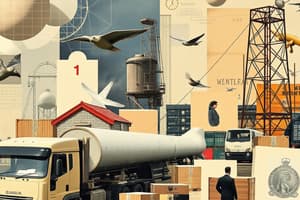Podcast
Questions and Answers
What does competitive advantage mean in the context of logistics?
What does competitive advantage mean in the context of logistics?
A company with competitive advantage can differentiate itself in the eyes of the customer and operate at a lower cost and greater profit.
What are the 7 "Rights" of Logistics?
What are the 7 "Rights" of Logistics?
The 7 "Rights" of Logistics are: Right product, Right customer, Right quantity, Right condition, Right place, Right time, and Right cost.
Logistics is the part of supply chain management that exclusively deals with the forward flow of goods and information.
Logistics is the part of supply chain management that exclusively deals with the forward flow of goods and information.
False (B)
What are some examples of logistics activities?
What are some examples of logistics activities?
Which of the following is NOT a factor that has increased the importance of logistics?
Which of the following is NOT a factor that has increased the importance of logistics?
What are the three main phases of logistics that deliver value to the customer?
What are the three main phases of logistics that deliver value to the customer?
What is the difference between supply chain and logistics?
What is the difference between supply chain and logistics?
Which of the following is NOT a typical logistics-related job?
Which of the following is NOT a typical logistics-related job?
Flashcards
Competitive Advantage
Competitive Advantage
The ability of a company to stand out to customers while also operating efficiently and profitably.
What is Logistics?
What is Logistics?
The process of planning, implementing, and controlling the efficient flow and storage of goods, services, and related information from the point of origin to the point of consumption to meet customer requirements.
Supply Chain
Supply Chain
It's an overarching concept that focuses on the collaboration of multiple businesses working together to get a product to market.
Logistics
Logistics
Signup and view all the flashcards
Council of Logistics Management definition
Council of Logistics Management definition
Signup and view all the flashcards
Logistics Management
Logistics Management
Signup and view all the flashcards
Changes in Consumer Behavior
Changes in Consumer Behavior
Signup and view all the flashcards
Technological Advances
Technological Advances
Signup and view all the flashcards
Growing Power of Retailers
Growing Power of Retailers
Signup and view all the flashcards
Globalization of Trade
Globalization of Trade
Signup and view all the flashcards
Reduction of Inventory
Reduction of Inventory
Signup and view all the flashcards
Reduction of Costs
Reduction of Costs
Signup and view all the flashcards
Economic of Scale
Economic of Scale
Signup and view all the flashcards
Reliability and Consistency
Reliability and Consistency
Signup and view all the flashcards
Minimum Damage to Products
Minimum Damage to Products
Signup and view all the flashcards
Quicker and Faster Response
Quicker and Faster Response
Signup and view all the flashcards
The 7 'Rights' Of Logistics
The 7 'Rights' Of Logistics
Signup and view all the flashcards
What are logistics activities?
What are logistics activities?
Signup and view all the flashcards
Reverse Logistics
Reverse Logistics
Signup and view all the flashcards
International Logistics
International Logistics
Signup and view all the flashcards
Warehousing Management
Warehousing Management
Signup and view all the flashcards
Demand Forecasting
Demand Forecasting
Signup and view all the flashcards
Procurement
Procurement
Signup and view all the flashcards
Order Management
Order Management
Signup and view all the flashcards
Inventory Management
Inventory Management
Signup and view all the flashcards
Facility Location Decisions
Facility Location Decisions
Signup and view all the flashcards
Customer Service
Customer Service
Signup and view all the flashcards
Transportation Management
Transportation Management
Signup and view all the flashcards
Materials Handling
Materials Handling
Signup and view all the flashcards
Packaging
Packaging
Signup and view all the flashcards
Logisticians
Logisticians
Signup and view all the flashcards
Logistics Consultants
Logistics Consultants
Signup and view all the flashcards
Logistics Specialist
Logistics Specialist
Signup and view all the flashcards
Logistics Manager
Logistics Manager
Signup and view all the flashcards
Supply Chain Coordinator
Supply Chain Coordinator
Signup and view all the flashcards
Supply Chain Manager
Supply Chain Manager
Signup and view all the flashcards
Customer Service Manager
Customer Service Manager
Signup and view all the flashcards
Procurement Manager
Procurement Manager
Signup and view all the flashcards
Transportation Manager
Transportation Manager
Signup and view all the flashcards
Study Notes
Basics of Logistics
- Logistics has evolved since the late 1940s. Initially, military use was primary, but recognized as a critical tool for enhancing competitiveness in the 1950s & 60s, it expanded beyond the army.
- Competitive advantage for companies is linked to delivering a product or service where customers perceive value at a lower cost, leading to greater profits.
- Logistics is crucial for getting products to customers when needed, enabling economic activity and trade.
Logistics Concept
- The Council of Logistics Management defines logistics as the part of supply chain management that handles the efficient flow of goods, services, and information from the point of origin to the point of consumption, adapting to customer needs.
- Logistics facilitates the efficient delivery of products and services to customers. It supports economic transactions, driving trade and commerce.
Logistics Management
- Logistics management is a vital component that maintains and coordinates the supply chain.
Increased Importance of Logistics
- Factors contributing to the increased importance of logistics include a reduction in economic regulation, changing consumer behavior, technological advancements, increased retailer power, and globalization of trade.
Logistics Objectives
- Key objectives include cost reduction, economies of scale, ensuring delivery reliability and consistency, minimizing product damage, and providing quicker and faster responses.
The 7 "Rights" of Logistics
- Right product, right customer, right quantity, right condition, right place, right time, and right cost—all crucial for effective logistics.
Logistics Activities
- Logistics activities encompass all processes from procuring raw materials to delivering products. Key activities include customer service, facility location decisions, inventory management, order management, procurement, transportation, demand forecasting, international logistics, materials handling, packaging, reverse logistics, and warehousing management.
Supply Chain and Logistics
- A supply chain encompasses the network of companies involved in delivering a product/service to the market.
- Logistics within a supply chain focuses on the physical movement and storage of items.
Difference Between Supply Chain and Logistics
- A supply chain is the network of companies, while logistics is the set of activities focused on the physical aspects of movement and storage within the supply chain.
Logistics Phases
- Inbound logistics (upstream) involves operations before manufacturing, encompassing raw material & component movement from suppliers.
- Process logistics deals with the operations directly related to transforming raw materials into finished goods (includes storage and movement within manufacturing facilities).
- Outbound logistics (downstream) involves operations after the production process, encompassing warehousing, transportation, and finished goods inventory management. This step directly services the end customer.
Logistics Careers
- Logisticians need to be both generalists, understanding the wider business context, and specialists, with in-depth knowledge of specific logistics activities.
- Typical logistics-related jobs include: logistics analyst, consultant, logistics specialist/manager, supply chain coordinator/manager, customer service manager, procurement manager, transportation manager, warehouse operations manager, and production planning manager.
Logistics Professionalism
- Professional logistics organizations include APICS, AST&L, CSCMP, Delta Nu Alpha, SOLE, SCL, and CILT (UK). There is also a Warehousing Education and Research Council (WERC).
Studying That Suits You
Use AI to generate personalized quizzes and flashcards to suit your learning preferences.




